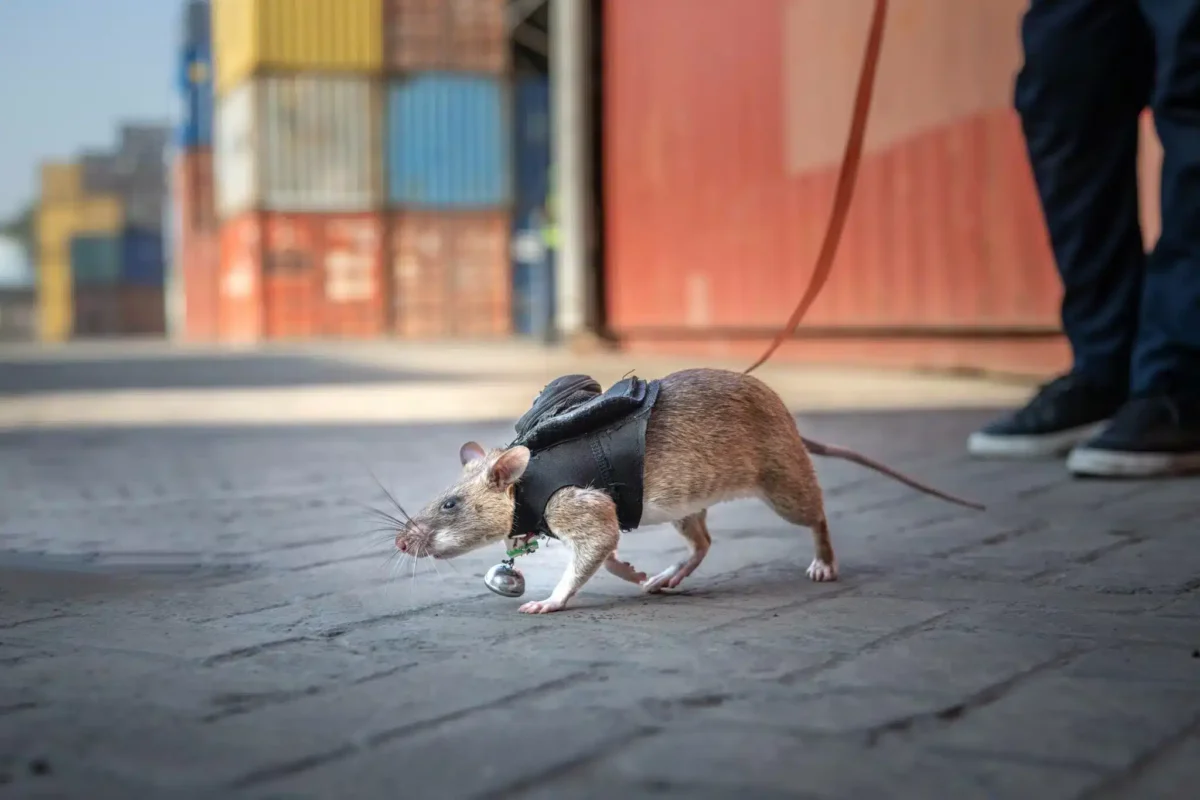As the world changes, APOPO continues to evolve. From humanitarian demining and disease detection to new frontiers of scent detection, our work is rooted in innovation — and that spirit continues to guide us as we explore expanded applications for our HeroRATs.
At the heart of this effort is our Innovation Department, based at the Sokoine University of Agriculture in Morogoro, Tanzania. Here, a dedicated team of Tanzanian and international experts is developing and testing new ways to apply the rats’ extraordinary scent-detection abilities. With their compact size, agility, and remarkable sense of smell, our rats are uniquely positioned to complement and enhance existing technologies across diverse fields.
Research and Development: Opening New Frontiers
The Innovation Department’s work focuses on expanding APOPO’s cutting-edge scent-detection technology. Building on decades of experience in explosive and TB detection, the team is researching and developing new applications that can make communities safer and protect our planet’s natural resources.
Many members of this team have transitioned from other APOPO departments — a reflection of the dynamic nature of our organisation and the career-progression opportunities we provide. This internal collaboration allows us to combine operational experience from the field with scientific expertise in the lab, ensuring that our innovations are both practical and impactful.
Search & Rescue: Life-Saving Potential in Disaster Response
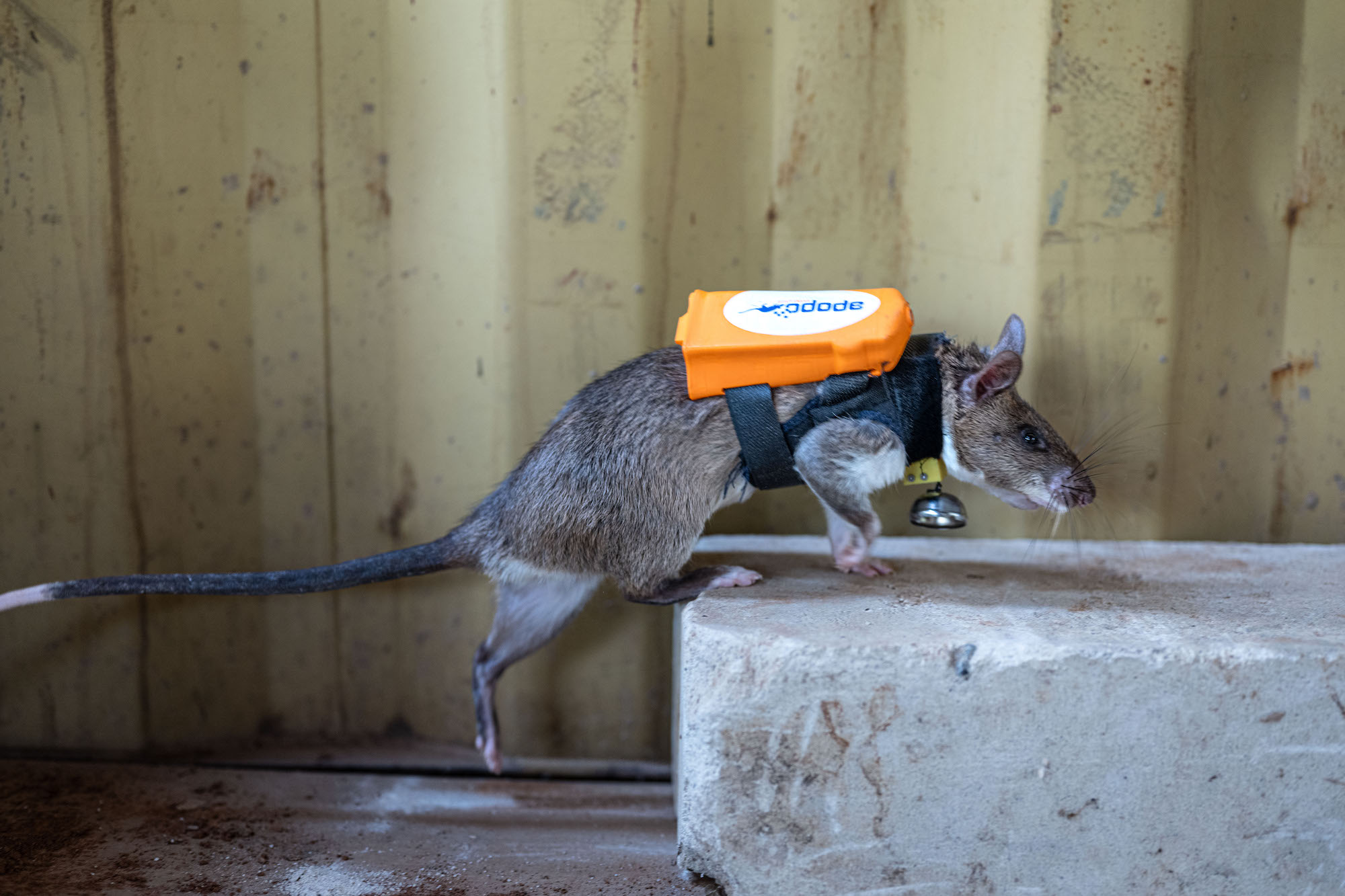
One of APOPO’s most ambitious projects is our Search & Rescue research project. This pioneering effort aims to train rats to locate survivors trapped under debris after disasters such as earthquakes.
In 2024, the programme reached a significant milestone. Our Project Lead, Danielle relocated to Türkiye in October to establish the groundwork for an upcoming pilot. Six specially trained rats will join the deployment in April 2025. These rats have undergone advanced training to locate people and then return to their release point on command — a critical skill for safe and effective deployment in real-life disaster-response operations.
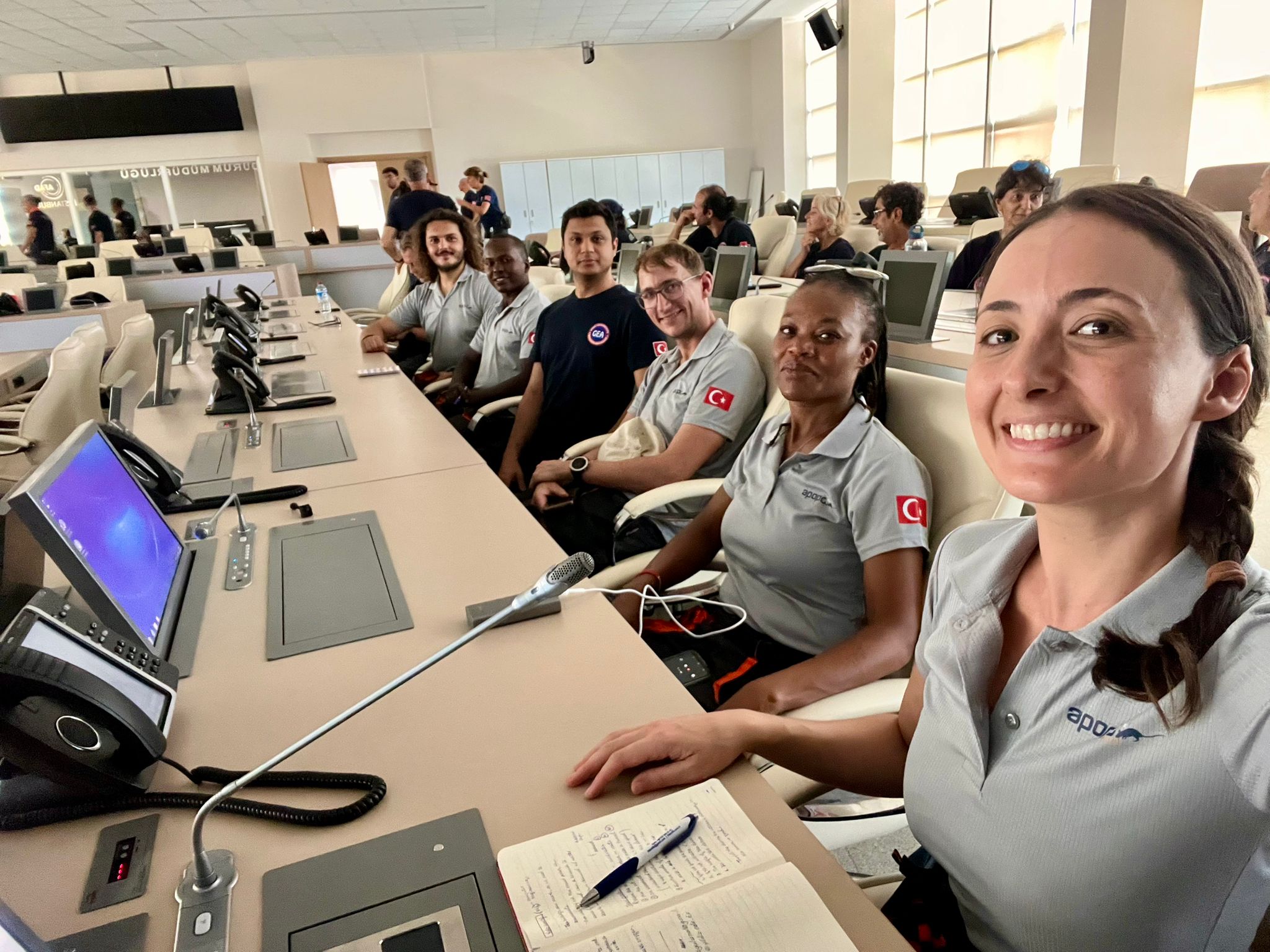
Training for the RescueRATs focused on resilience in operational conditions: locating individuals in complex debris scenarios, across variable environments, and under realistic conditions where the rats are not predictably rewarded for finding a person. In parallel, we started training a new cohort of seven young rats under a refined protocol that draws on lessons learned from the first group.
On the technology side, we advanced the design of the “RescueRAT backpack” used for tracking and communication. A fourth prototype — lighter, more compact, and with improved transmission technology — was developed and tested in Morogoro in 2024 and 2025, showing the rats were significantly more agile, though overheating remained a challenge. Based on those insights, our team identified WiFi HaLow as a more suitable transmission technology. Field trials of this upgraded model will take place in Türkiye in collaboration with our partner, GEA (Search and Rescue Association).
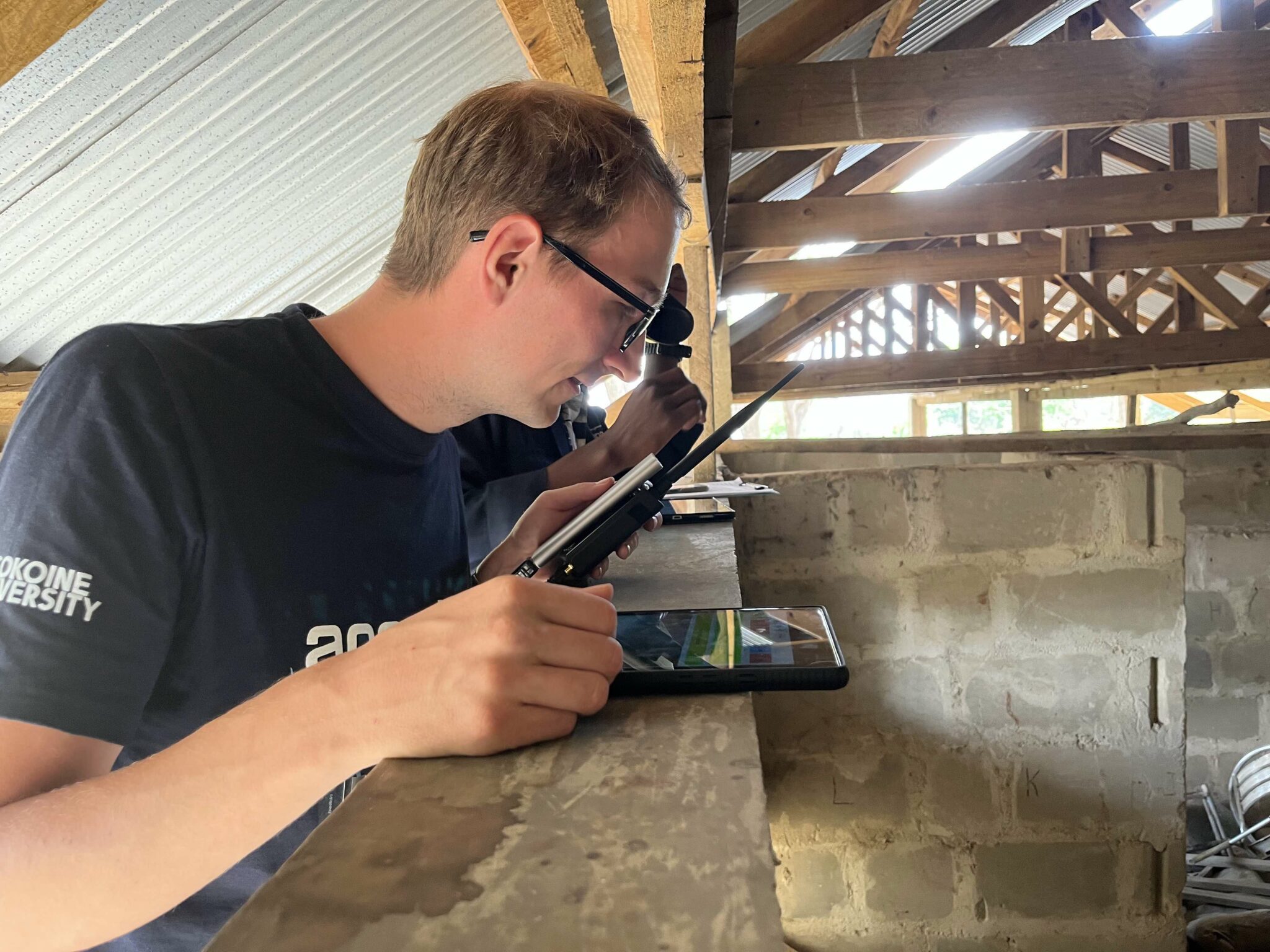
This technical progress was driven by electrical engineer Sander Verdiesen, a Technical University Eindhoven alumnus, in earlier collaboration with Netherlands-based engineering firm Vention. Sander continues to refine the backpack’s design, data transmission, and durability to ensure the rats can operate safely in real-world conditions.
Wildlife Detection: Protecting Nature With Precision
Another promising area of innovation is our Wildlife Detection program. These rats are trained to identify the scent of trafficked species and wildlife products such as pangolin scales, ivory, timber, and giraffe parts. Their work supports customs authorities and conservation agencies in the global fight against illegal wildlife trade.
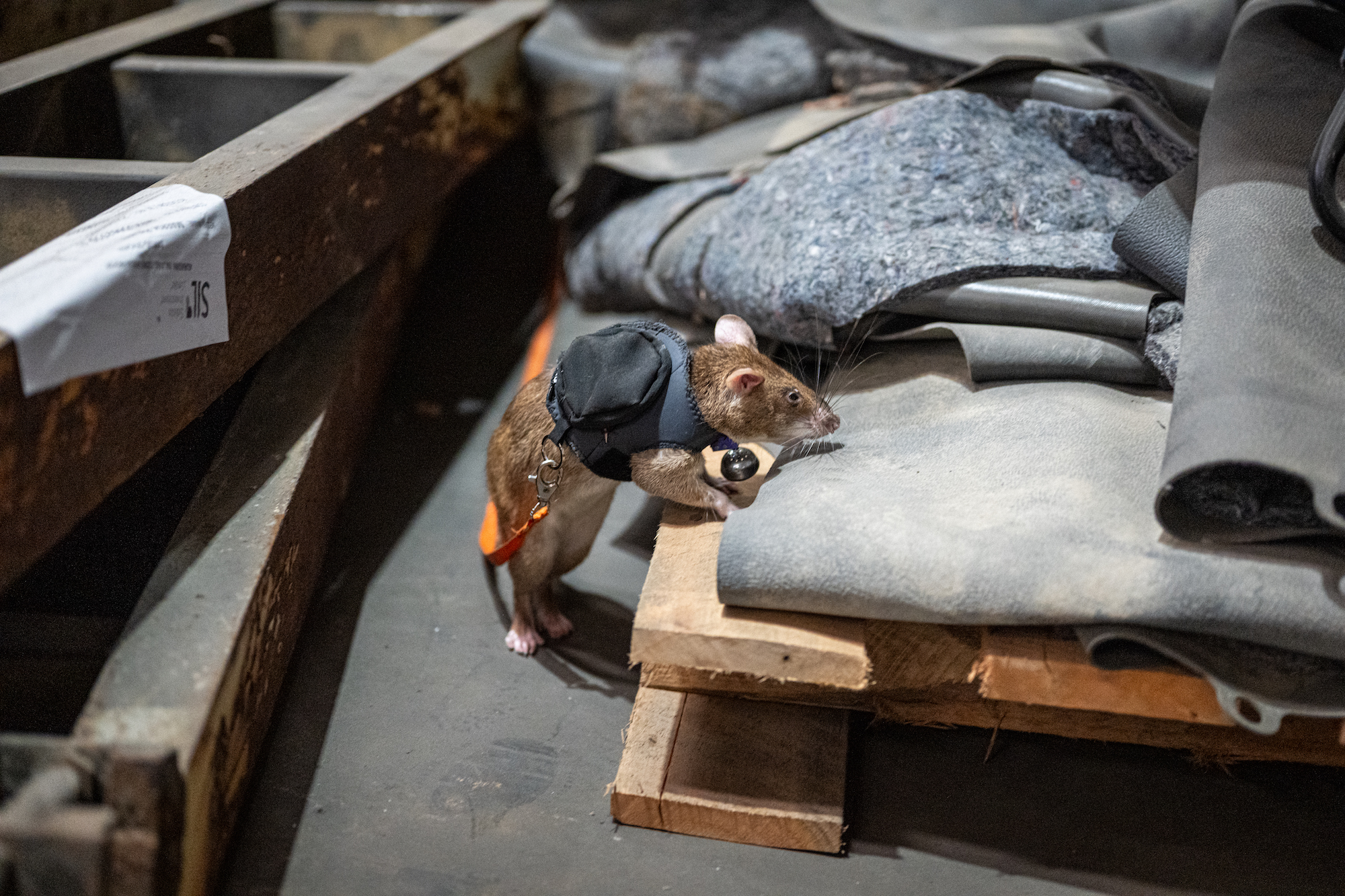
In 2024, the project achieved several major milestones:
- The rats completed a second round of operational trials at a large seaport and participated in initial trials at an International Airport.
- A new generation of detection rats began training, incorporating insights from earlier cohorts.
- At the seaport, the rats trained for 16 weeks using four search strategies: on a leash, with a trolley on wheels, sniffing shipping-container air vents, and searching freely inside containers. After 11 weeks of precision tests with daily new samples from our partner, the Tanzania Wildlife Management Authority (TAWA), they achieved an 87% success rate, improving on 2023’s 83 %.
- When the three best rats from each strategy were analysed, the teams achieved a 100% detection rate using the leash, trolley, and air-vent methods, while the free-search method achieved 67 %.
- At the airport, the rats trained for six weeks (limited to leash and trolley searches due to space and environmental constraints) and reached 91% accuracy.
- In October 2024, a new generation began training — including one named Jane Goodall, after the renowned primatologist who visited APOPO in July, 2024.
Jane, one of our most promising Wildlife Detection Rats, is also available for public adoption. Adopting Jane helps support her training and care, while connecting donors directly to the progress of this groundbreaking programme. As an adopter, you’ll receive updates on Jane’s journey as she learns to protect endangered wildlife — a unique opportunity to be part of a global conservation effort.
The Wildlife Detection programme has received vital support from the Anne Innis Dagg Foundation, whose mission is to protect endangered species — particularly giraffes — and fund conservation research and education in Africa. This partnership helps expand the rats’ role in detecting trafficked wildlife products, including those from threatened giraffe populations, reinforcing the Foundation’s goal of promoting coexistence and biodiversity protection.
Full deployment of APOPO’s Wildlife Detection Rats at the seaport and airport is expected in 2025, alongside exploration of additional deployment sites across East Africa.
Partnership and Donor Support
The Innovation Department’s achievements are made possible through the dedication of our team and the generosity of donors who share our vision for a safer, healthier, and more sustainable world.
Support from foundations such as the Anne Innis Dagg Foundation, academic partners including Sokoine University of Agriculture and Ankara University, and engineering collaborators such as Vention ensures that APOPO’s innovation pipeline continues to thrive.
We are actively seeking new donors and strategic partners to help us expand these life-saving and conservation-focused initiatives. Every contribution fuels further research, field trials, and technological breakthroughs — driving real-world impact across humanitarian and environmental challenges.
Looking Ahead: Scaling Impact
As we look to the future, APOPO remains committed to driving innovation and expanding the positive impact of our HeroRATs. From disaster response to wildlife protection, our scent-detection solutions are designed to be fast, scalable, and cost-effective.
Every discovery brings us closer to that goal and with continued investment and collaboration, the possibilities for scent detection are nearly limitless.

